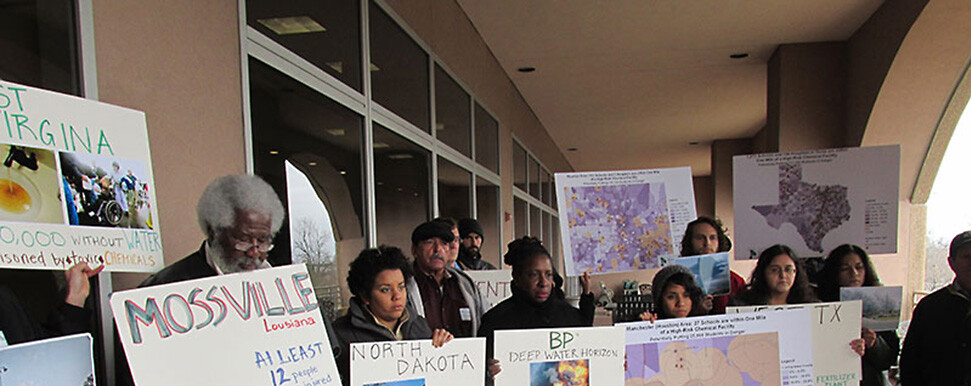
Media
May 23, 2013Toxic Chemicals Reform Bill: Statement from Environmental Justice and Health Alliance for Chemical Policy Reform
Contact: Stephenie Hendricks, (415) 258-9151, shendricks@comingcleaninc.org
(Washington, DC) Michele Roberts and Richard Moore, spokespersons for the Environmental Justice and Health Alliance for Chemical Policy Reform, provide these comments on the “Chemical Safety Improvement Act” (CICA) introduced yesterday by Senators Frank Lautenberg and David Vitter.
"Communities living on the fenceline of polluting industries, chemical storage facilities, and other immediately dangerous industrial operations have worked together for more than seven years on a federal bill that would protect people from the acute and chronic dangers of industrial toxic chemicals.
Their organizing and commitment has delivered this moment when Congress might actually take up meaningful action.
Yet our understanding is that the sections of the former Safe Chemicals Act requiring protections for “hot spots” – communities most impacted by chemicals – and expedited action to restrict known persistent, bioaccumulative and toxic chemicals are not included in the compromise bill. We are deeply disappointed that those most harmed by failed chemical regulations and those who have worked tirelessly to support industrial chemical protections for all people will themselves be left inadequately protected under the Chemical Safety Improvement Act.
Our commitment remains to restrict chemicals we already know are persistent, toxic and bioaccumulative and therefore a threat to people. We want to make sure this legislation will achieve equal protection from toxics for all people, and eliminate these "hot spots" or as we refer to them, sacrifice zones where people of color and low income people, the sick, and the most vulnerable are forced to bear more polluting and threatening industrial emissions sources in places where we live, work, play, worship, and go to school.
A just policy that includes “hot spots” to protect those most vulnerable will ensure these constituents-- in states as diverse as New Jersey, Louisiana, New York, Michigan, Kentucky, California, Texas, Delaware, South Dakota, New Mexico, Alaska, and Minnesota, are not left behind. The ongoing release of persistent, bioaccumulative, toxic chemicals is also of great concern to Arctic Indigenous peoples who have some of the highest chemical body burdens of any population on earth.
The Environmental Justice and Health Alliance for Chemical Policy Reformis actively tracking the progress of the bill and meeting with our representatives both on the ground and in political office as the particulars of the bill become clear and our analysis unfolds."
Available for Comment
Michele Roberts; Co-Coordinator, Environmental Justice Health Alliance for Chemical Policy Reform; (202) 704-7593, mroberts@comingcleaninc.org. Michele can address TSCA policy issues and the impacts on communities in Mossville, Louisiana and other historic African American communities.
Richard Moore; Los Jardines Institute; Co-Chair, Environmental Justice and Health Alliance for Chemical Policy Reform; (505) 301-0276, ljinewmexico@gmail.com. Richard can talk about environmental justice issues and organizing in the Southwest, and TSCA reform. Habla Espanol.
Cecil Corbin-Mark; Director of Programs, WE ACT for Environmental Justice ; (212) 961-1000 ext. 303, cecil@weact.org. Cecil can address environmental justice and chemical exposure issues.
Juan Parras; Executive Director, Texas Environmental Justice Advocacy Services; (281) 513-7799, parras.juan@gmail.com. Juan works with those most impacted by chemicals in the Houston area and runs "toxic tours" showing the shocking conditions where people are.
Jose Bravo; Director, Just Transition Alliance; National Coordinator, Campaign for Healthier Solutions; (619) 838-6694, jose@comingcleaninc.org. Jose works with communities contaminated with chemicals, which occurs mostly where low income people of color are living, although everyone is at risk. Habla Espanol.
Vi Waghiyi; Environmental Health and Justice Program Director, Alaska Community Action on Toxics; (907) 222-7714 . Vi can speak to the shocking chemical test results of the St. Lawrence Island, Alaska traditional foods and human health bio-monitoring results of Alaska native people.
